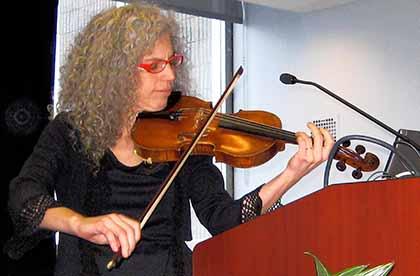By Howard Koplowitz
Women from the world of music discussed the difficulties of breaking into the business and the progress women have made since during a forum Monday at Queens College.
Diane Wittry, conductor of the Allentown, Pa., and Norwalk, Conn., symphonies, said she would never have attained those positions “if I had grown up 10, 15 years earlier.”
Wittry said auditions for orchestras used to take place behind a screen, so nobody would know who was auditioning.
She said she knew a woman who wore trousers and man’s shoes on an audition because the screen did not cover up the entire person.
Unlike the past, Wittry said the string sections of most symphonies today are entirely made of women.
“I think we’ve made a tremendous amount of progress in that area,” she said at the forum as part of Women’s History Month.
When she was in auditions as a conductor, Wittry said it was “trendy” to have women as guest conductors when she was coming up in the business, but that the women were often “tokens.”
Wittry is also the author of “Beyond the Baton,” which she said deals with the conductor’s job “off the podium” and said women are better equipped to handle such situations than men.
“I think we like dealing with people and helping people understand their feelings,” she said, noting her book teaches conductors how to work with their board of directors, difficult people and their orchestra members.
Alicia Svigals, a founder of the Grammy-winning Klezmatics, said she had been fired from the band when she became pregnant and won a large settlement after she filed a sex discrimination suit.
Svigals became involved in klezmer, or traditional Eastern European Jewish folk music, in the late 1970s.
“It was very hard to be a woman in the music world when I was starting … and it’s a lot easier now,” she said.
Svigals said being the only female member in the band for 17 years had been difficult at times, saying at one point the group dismissed one of her suggestions but approved of it when one of the men vocalized the same idea.
“It was very hard to be heard,” she said.
Svigals also said she was subject to “locker room talk” while on tour with her band and she missed out on wedding and bar mitzvah gigs among Orthodox Jews due to their beliefs that men were not supposed to hear women sing “because it might sexually arouse them and that’s a bad thing.”
“The situation for a woman in Jewish music in particular has its own twist to it,” Svigals said.
Gwendolyn Pough, a professor at Syracuse University and author of “Check It While I Wreck It: Black Womanhood, Hip-Hop Culture, and the Public Sphere” spoke about women in the hip-hop world.
Pough said men who write about hip-hop and rap routinely dismiss the contributions of groups like Salt-N-Pepa and hip-hop artists Foxxy Brown, Lil’ Kim and Missy Elliot to the genre.
“Women have always been a part of hip-hop culture,” Pough said. “They’ve always been a significant part of rap music.”
Pough said female artists have “pushed the limits of sexuality” in their songs, including the R&B song “Tonight Is the Night,” about a girl losing her virginity.
“What would R&B be like without references to sex?” Pough asked rhetorically.
Pough said more recent artists, including Rihanna and Nicki Minaj, are “erotic revolutionaries,” referring to Rihanna’s song “S&M” and Minaj’s “lyrics that tout lesbian identity.”
Pough also pointed out there are lesbian MCs that are not in the mainstream.
“We are making progress but we have a way to go,” she said.
Reach reporter Howard Koplowitz by e-mail at hkoplowitz@cnglocal.com or by phone at 718-260-4573.



































